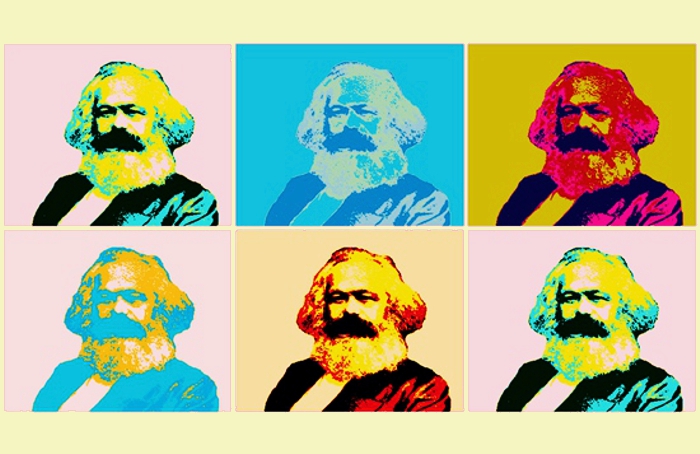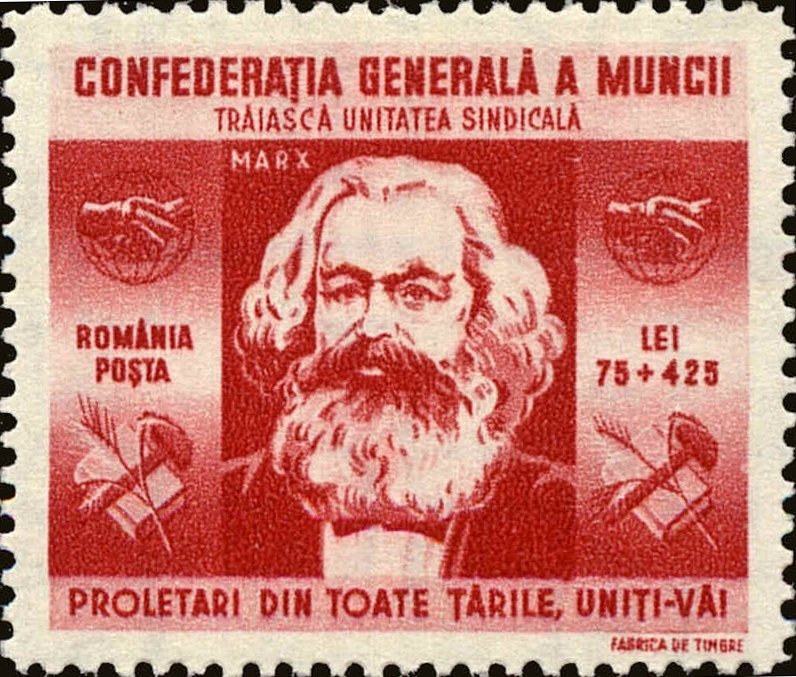
Contrary to persisting myths, Marx’s work was not a bigoted crusade against the capitalist world he lived in: in fact, he thought that capitalist society was a step ahead of the feudal one and was a necessary precondition for socialism.
by Michael Grech
Image by the IotL Magazine (assisted by popartstudio)
[dropcap]T[/dropcap]he following is a small contribution aimed at debunking five caricatures concerning Marx and his thought. It is not a scholarly work. One reason why it cannot be scholarly is that anyone who is versed in Marx’s work would know that what I highlight are caricatures. Yet, they are taken as expressive of fundamental features of Marx’s works by many, even featuring in books and articles! They are even upheld by people who claim to admire if not follow the great thinker.
Myth 1. Marx Was a Tad Too Utopian
Many think of Marx as some idealistic and somehow impractical prophet of a ‘perfect’ society, a champion of a nice but unworkable utopia. Marxism would involve a negative moral assessment of capitalist society and a blueprint of how to create a better world, which will come into being once enough good-willed individuals are convinced about its virtues.
The story then continues that Marx got it terribly wrong concerning human nature, by assuming that it is much more altruistic and selfless than it actually is.
![]()
Fact: The above is indeed an over-simplified reading of Marx. Socialism in Marx’s day and later contained a utopian wing; people who thought they could bring into being a socialist world simply by appealing to good-willed individuals who—regardless of the economic, cultural and political conditions and situation of the society they inhabited—would give birth to the utopia.
These Utopian Socialists were a main target of Marx’s scorn because, he argued, a socialist society cannot come into being through sheer good-will of individuals, regardless of the economic, cultural and political conditions that surround them. Good-will and political commitment are necessary to give birth to a socialist society, as indeed to bring about anything else. Yet, they are not sufficient. The material, social and economic conditions that allow such society to come into being must also be in place; ignoring them is akin to imaging modern society, lifestyle and technology in a pre-historic setting.
As Marx himself would have it, humans make their history, including building societies or fashioning political states in one way or another, but: ‘they do not make it as they please; they do not make it under self-selected circumstances, but under circumstances existing already, given and transmitted.’ (The Eighteenth Brumaire of Louis Napoleon.)
Myth 2. Marx Was a Rabid Anti-capitalist
This myth is closely related to the previous one. Marx obviously worked tirelessly to help a socialist society come into being. Yet, his was not a bigoted crusade against the capitalist world he lived in: in fact, he thought that capitalist society was a step ahead of the feudal one and was a necessary precondition for socialism.
![]()
Fact: Marx’s most important work is not a blueprint of a communist utopia but an analysis of capitalist society, Das Kapital. He appreciated many of the innovations and novelties enabled by capitalism which previous economic setups were unable to produce. For instance, due to the technological advancements it fostered, capitalism promised to satisfy people’s material needs for the first time in history.

Marx was not a proto-hippie who dreamt of turning back the clock to the pre-capitalist times. He was well aware of the contradictions of capitalism, by which he was morally appalled and took an active part—his critical analysis and his political militancy—in the movement which sought to supersede capitalism. Yet, he never failed to appreciate the latter, even if, as a stage in history to be overcome.
Myth 3. Marx Was the Champion of Equality
Many boil down communism or Marxism to an extreme form of equality; extreme compared to what bourgeois liberal thought considers as ‘reasonable’ equality, namely political and civil rights. The story goes that, by calling for ‘economic equality’—a scenario where everyone ends up getting the same wages or goods—Marx went too far. The liberal wisdom then promptly adds that economic equality would eliminate all incentives for individual ambition and competition, supposedly required for a further technological breakthrough of humankind. Apart that, such equality would be unattainable.
The equality narrative became to sound dystopian once it was mocked by George Orwell’s ‘All animals are equal, but some animals are more equal than others’ passage. Since ‘Animal Farm’ was an allegory of a supposedly Marxist regime, the passage is often used to expose an ingrained hypocrisy of a Marxist ideal. However, this story is a false interpretation of Marx.
![]()
Fact: In the Critique of the Gotha Programme, Marx refers to how distribution would take place in a communist society: ‘from each according to their ability, to each according to their need’. This implies that if X needs more than Y, X will get more than Y; that if a can contribute more than b, a will contribute more. The two will not earn equal wages or receive the same outcomes. In Marx’s work, the concept of equality is generally criticised as an abstract bourgeois notion.

In the words of Friedrich Engels: ‘The concept of a socialist society as a realm of equality is a one-sided French concept deriving from the old “liberty, equality, fraternity,” a concept which was justified in that, in its own time and place, it signified a phase of development, but which, like all the one-sided ideas of earlier [Utopian] socialist schools, ought now to be superseded, since they produce nothing but mental confusion, and more accurate ways of presenting the matter have been discovered.’ (Letter to August Bebel)
Myth 4. Marx Called for an Antidote to ‘Opium’
This myth is particularly widespread in societies where religious worldview remains dominant, not only in the West but also in other parts of the world, including Muslim societies. The philosopher and the economist is often mis(quoted) stating that Religion is the Opium of the People. According to this myth, Marx was primarily interested in combating religion, a precursor of Richard Dawkins.
![]()
Fact: Marx was a convinced atheist. Yet, he did not conceive of his mission in life as spreading atheism. Indeed, even in the early works where the concept of alienation plays a fundamental role, he does not, contrary to Feuerbach and other young Hegelians, see religion as the main source of alienation.
Marx rather conceives alienation in terms of human labour: what characterises the human species is externalised and objectified (turned into an object) in the products the labourers produce. The labourers’ alienated labour then (in the form of products) is appropriated by their employers and sold on the market. It hence ends up sustaining the class that is exploiting them and is, also materially, alienated from the worker.
As to religion itself, Marx considered it as one of the ideological means whereby the world and human relations are constructed akin to a camera oscura; providing an upside down snapshot of reality. In Introduction to a Contribution to the Critique of Hegel’s Philosophy of Right, he states that ‘The abolition of religion as the illusory happiness of the people is the demand for their real happiness.’ Yet, even when in the same work he uses the famous phrase ‘opium of the people’, he does not use the ‘opium’ metaphor entirely negatively, acknowledging that ‘Religious distress is at the same time the expression of real distress and also the protest against real distress.’ In other words, opium may make distress bearable.
Today some Marxist theorists like Terry Eagleton as well as a number of Liberation Theologians within various religious traditions take a critical approach to these passages (i.e. considering both their limits and possibilities), and believe in the possibility of a creative exchange and engagement between Marxist thought and the fundamental tenets of various religions.
Myth 5. Marx Argued That Ideas Don’t Count
At the opposite end of the Marx-mythology spectrum there is the view that Marx had total disregard for the ideas people have; that he imagined humans as some kind of economically determined zombies. Everything is controlled by the ‘economic base’, i.e. by the relations that concern the production of goods in a society. Ideas, belonging to the ‘superstructure’ would be ineffective. Focusing on them would be positively misleading. This caricature is also common amongst many so-called Marxists.
![]()

Fact: Although some passages in his work might suggest such a reading, the above is another simplification of Marx’s writing. Reducing all relations to economic determinism would be clearly fallacious. Consider one of the relations that make up the economic base, the relation between a salaried labourer and their employer. Physical logistics are not the only condition that supports this relation; it also requires employer and employee accept certain ideas concerning work, property and how to produce goods (for instance, that it is right that one works for a salary, that private property is legitimate, etc.). Ideas then, play a concrete and fundamental role.
In a nutshell and in very simplistic terms, Marx argued that economic base and the realm of ideas interact with each other, with the former being determinate in ‘the last instance’ (whatever this means). It may sound complicated, but could be illustrated by this example: the ideas—work ethics or the belief in private property as something inherently positive, but also their legal frameworks—follow the (material) reality of property relations and power structures. However, if people manage to change the ideas, material realities in turn may change.
Leave a Reply